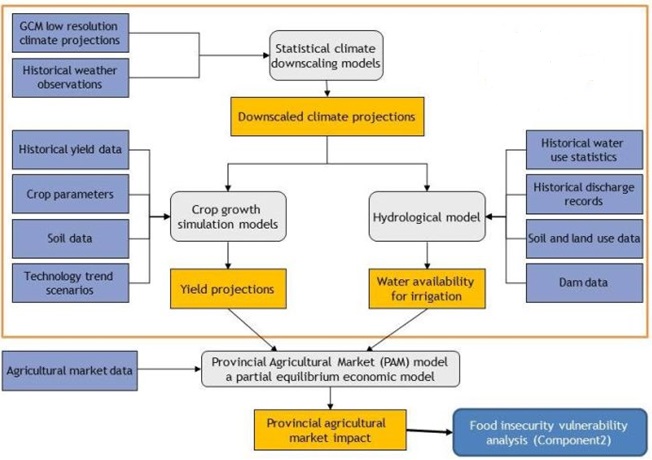Component 1: Impacts of Climate Change on Agriculture
 The first component involves the generation of spatially downscaled climate change scenarios and a robust assessment of the impacts of climate change on agriculture using FAO's new tool called Modelling System for Agricultural Impacts of Climate Change (MOSAICC). MOSAICC is an integrated package of models for assessing the impacts of climate change on agriculture, including the variations in crop yields and their effects on national economies.
The first component involves the generation of spatially downscaled climate change scenarios and a robust assessment of the impacts of climate change on agriculture using FAO's new tool called Modelling System for Agricultural Impacts of Climate Change (MOSAICC). MOSAICC is an integrated package of models for assessing the impacts of climate change on agriculture, including the variations in crop yields and their effects on national economies.
Component 1 uses three modules of MOSAICC and a newly developed economic model:
The Climate Component
The Climate Component (a MOSAICC module) facilitates the preparation of statistically downscaled climate data using an adapted portal developed by the EU ENSEMBLES project. See final report on Climate downscaling.
Local partner: Philippine Atmospheric, Geophysical and Astronomical Services (PAGASA).
Model partner: Santander Meteorology Group, University of Cantabria.
The Hydrology Component
The Hydrology Component (a MOSAICC module) estimates water resources under future climate conditions and uses STREAM, a grid-based precipitation-runoff model, to simulate the discharge rate in large catchment areas. See final report on Hydro modelling.
Local partner: University of the Philippines - National Institute of Geological Sciences (UPNIGS).
Model partners: Water Insight and Wageningen University.
The Crop Component
The Crop Component (a MOSAICC module) simulates crop yields under future climate change and technological progress scenarios. It uses WABAL (a crop specific water balance model), the industrial version of FAO's AgroMetShell.
Local partner: Philippine Rice Research Institute (PhilRice). See final report on Crop modelling.
The Economy Component
The Economy Component makes use of the Provincial Agricultural Market (PAM) Model to evaluate the economic impacts of future crop yields and water resource projections. See the final report on Market modelling.
Local partner: National Economic and Development Authority (NEDA).
Provincial Agricultural Market (PAM) Model

